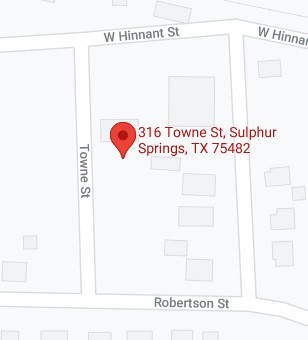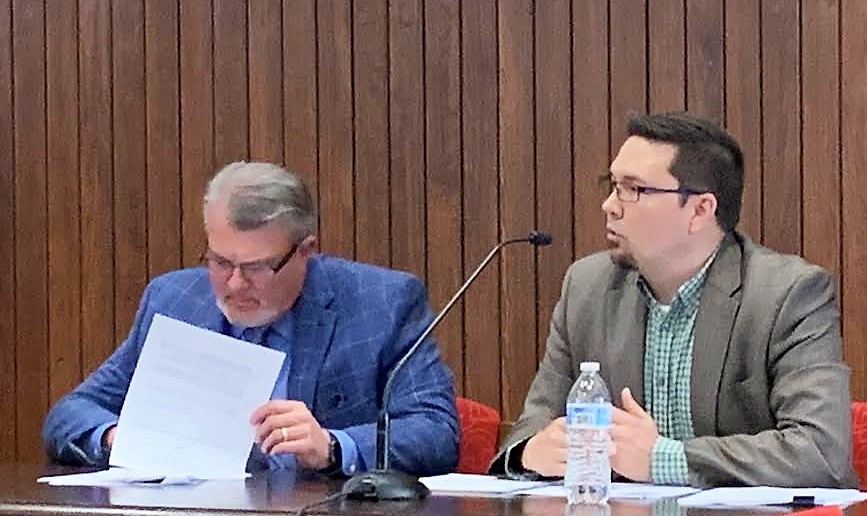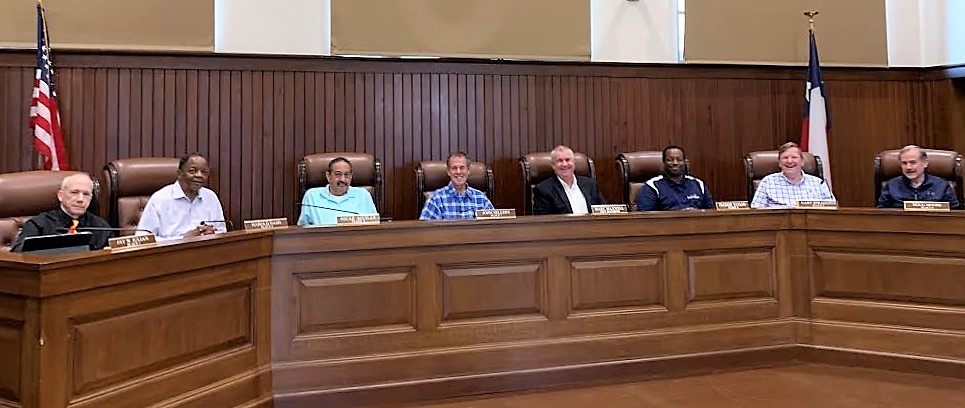Sulphur Springs City Council Declines Oncor’s Application To Increase “Distribution Cost Recovery Factor” Rates
A 380 agreement was granted for a Towne Street property, while a requested rate increase by Oncor was denied by Sulphur Springs City Council at the regular May council meeting. The City Council also approved an interlocal purchasing agreement with the City of Frisco.

380 Agreement
At the recommendation of staff, the City Council granted a 380 agreement to Jeff Orwosky for a property located at 316 Towne Street, between Hinnant and Robertson Street. The lot is currently vacant and there are no taxes owed on the lot. The applicant is seeking only reimbursement of tap and building fees associated with building a 1,690-square foot single family home on the property, Sulphur Springs Community Development Director Tory Niewiadomski told the council Tuesday evening. Approval of the request for a 380 agreement for 316 Towne Street was recommended by city staff.
Place 6 Councilman Doug Moore asked if there’s a map or list of properties eligible for 380 infill housing agreements. Niewiadomski said the city does get a lot of enquiries about the feasibility of a property for these types of agreements.
“In most circumstances almost any lot in the city is eligible, outside of the Highway 19-Loop 301-I-30 area,” the community development director noted. “We do have the policy on the website. Really the only requirement is that it has to be on an existing street served by existing utilities — sewer, water and street.”
Sulphur Springs City Manager Marc Maxwell said what makes the 380 infill housing development agreements work for so many is that there are many lots that have issues: back taxes are owed on them, there are liens for mowing or demolition. When the liens are subtracted from the value of the property, it renders the property practically worthless. Some will go out and do some legwork and find those properties they can buy “on the cheap” then pay off the encumbrances and build a home on the property. Once constructed, the encumbrances will be repaid to those with a city-approved 380 agreement listing them.
“It’s a sweet deal and we’re starting to see people take advantage of it,” Maxwell said.
“Just to add to that, we spoke to the county and they are looking at participating in this program as well, if there are back taxes with the county,” Niewiadomski said.
“From the city and county’s perspective there’s noting to lose. I mean, we’re refunding what they pay to clear up those issues. Then, forever after there’s a home on the property. It’s a win-win,” Maxwell said.
Spraggins noted that typically, the city will “break even” then benefit from having the property back on the tax role and paying city utilities.

Maxwell said really, it benefits the city from the time the home is constructed. While the city refunds those fees, which they wouldn’t have received without the construction, and the property once constructed is on the city tax role and upon occupancy, city utility fees would be collected from that address as well.
Niewiadomski noted a typical property will generate about $1,500 in revenue annually for the city.
“All these new houses being built in these gaping holes around town, is really looking good,” Spraggins notes.
“It sure is,” Sulphur Springs Mayor John Sellers agreed.
Oncor Rate Increase Application
The city approved a resolution which not only declines Oncor Electric Delivery Company LLC’s
“The shortened version is Oncor is applying for a rate increase. We go through this with Oncor almost all the time. This particular rate increase is called the distribution cost recovery factor. As you know, we belong to a group of cities that call ourselves OCSC. We group together and we challenge when we think they need to be challenged, which is generally the case,” Maxwell explained to the City Council during their regular meeting on May 4.
The legal council for the OCSC recommended that the cities officially deny the request by passing Resolution 1240. Experts will be brought in to review the filing and make recommendations, with a negotiation process between Oncor and the cities group beginning thereafter. Typically, an amount “in the middle,” a figure between the requested amount and the current rate, is reached. The process is expected to take a few months.
Maxwell and city staff recommended approving Resolution No. 1240, denying the requested distribution rate increase. On a motion by Place 5 Councilman Gary Spraggins then made a motion, the resolution was approved.
Purchasing Agreement
Sulphur Springs Fire Chief/Marshal Davis James asked the City Council to consider formally entering into an interlocal agreement with the City of Frisco for purchasing of goods and services commonly used by both cities.
“This agreement, we’ve piggybacked off of it for years. For us to maintain our current prices with our vendors and service providers, they are requesting this documentation. It provides a substantial saving to us as of right now,” James told the City Council during Tuesday evening’s regular council meeting.
Maxwell noted that while the city has agreements and participates in purchasing cooperatives such as BuyBoard, the City of Frisco receives better deals. The agreement will allow Sulphur Springs to receive Frisco’s discounts for certain items.
James estimated that the City of Sulphur Springs has been piggy backing off Frisco for 15 years, benefitting from the other city’s discounted rates for certain specialized goods and services. It’s just now been brought up that there’s no interlocal agreement in place, and one is being requested in order to receive the discounts afforded to the City of Frisco.
The City Council approved Resolution No. 1239 approving an interlocal agreement between the City of Sulphur Springs and City of Frisco for purchasing of goods and services commonly used by both cities.
Other Business
Place 3 Councilman Oscar Aguilar noted that Ramsey and Putman Streets, just off College Street filled up with water during the rain earlier in the week. He asked if those would be addressed by city crews in the near future. There is an issue, Maxwell noted, with water going under College Street. The drainage issues would likely be addressed at the College Street intersections when College Street is rebuilt in the near future. The plans for the College Street project are done; work is slated to begin following completion of the Saputo sewer main project.
The Saputo Sewer Main project was 40 percent complete Tuesday. Workers began at the downstream side of the project or downhill and are working their way up toward the interstate and will continue working toward Saputo, Maxwell noted.
A special City Council meeting has been scheduled for noon Tuesday, May 11, 2021. The council is slated to go into executive session after calling the meeting to order in order to discuss potential economic development projects, dubbed Project Hold Fast and Project Flourish, according to the agenda posted on the city website on May 6. The city manager was authorized at the April City Council meeting to meet with representatives to continue negotiations for the two potential future economic development projects. If either its forwarded from the closed session for action, the City Council could then opt to discuss and vote on the matter upon returning to the regular open session.








